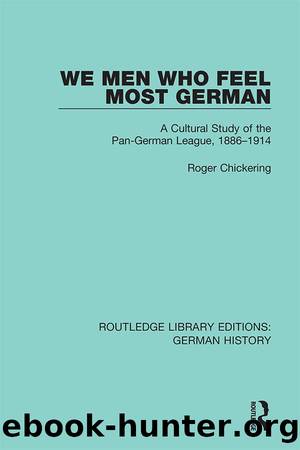We Men Who Feel Most German by Roger Chickering

Author:Roger Chickering [Chickering, Roger]
Language: eng
Format: epub
ISBN: 9780367028138
Publisher: TaylorFrancis
Published: 2019-09-15T00:00:00+00:00
The Public Obligations of Patriotism
Had the activities of the local chapters taken place in isolation, they would be of greater interest to folklorists than to historians of German society and politics. These activities did not, of course, take place in isolation; the local chapters that sponsored them were parts of broader local networks of associations (to be considered in the next chapter) and cells in a national organization through which these activities were orchestrated for the greatest political effect.
At first appearance, the Pan-German League was democratically organized at the national level. To judge from the national bylaws the key institution was the national board of directors (Vorstand), a body of about 200 men composed of the representatives of the local chapters (after 1903 one for every hundred dues-paying members in a given chapter) and other men selected by co-optation.134 The national board of directors was responsible for determining the position of the Pan-German League âon all basic questionsâ (including changes in the bylaws) and for selecting, from its own numbers, the members of the two higher agencies, the executive committee (geschäftsführender Ausschuss) and the praesidium (Hauptleitung).
The democratic trappings were a facade. The structure of power at the top of the Pan-German League resembled in actuality a series of concentric circles, in which the smaller the circle the greater the exclusivity and access to real power.135 The national board was the largest circle. The executive committee, which consisted of about twenty men serving three-year terms, was the agency that actually formulated the Leagueâs policies on most issues. The praesidium was made up of about a half-dozen men drawn from the executive committee and included the chairman and vice-chairman of the League. The praesidium consisted in fact of a small circle of the chairmanâs closest confidants. The power of the men at the top rested on their rights of co-optation, which guaranteed that the flow of authority downward was always greater than the nominal influence from below. For all intents and purposes, the praesidium chose the executive committee, and the executive committee in turn chose most of the national board.136
The consolidation of power at the top of the League was not an automatic process. Hasse was long an advocate of decentralization, for he believed that the health of the organization demanded more than a cosmetic role for the chapters in shaping policy.137 The same dynamics that bred elitism among the officers of the chapters, however, encouraged the increasing centralization of power at the national level. Many of the chapters proved uninterested in exercising the influence the bylaws afforded them: they failed to nominate representatives to the national board or to make their views known in other ways.138 The men who composed the elites within the active chapters were usually co-opted into one or more of the national agencies, where they themselves began to see the advantages of continued centralization.
In the authoritarian distribution of power, the League as a whole looked like the individual chapters writ large. Important decisions were made at the top, usually in the executive committee.
Download
This site does not store any files on its server. We only index and link to content provided by other sites. Please contact the content providers to delete copyright contents if any and email us, we'll remove relevant links or contents immediately.
The European Opportunity by Felipe Fernández-Armesto(569)
The European History Highway: A Guide to Internet Resources by Dennis A. Trinkle Scott A. Merriman(535)
Morgan Kaufmann Digital Watermarking and Steganography by Ingemar Cox Matthew Miller Jeffrey Bloom Jessica Fridrich Ton(528)
The Seven Wonders of the Ancient World by Michael Denis Higgins(521)
Hyperculture by Byung-Chul Han(509)
European Security without the Soviet Union by Stuart Croft Phil Williams(506)
European Security in a Global Context by Thierry Tardy(505)
The Routledge companion to Christian ethics by D. Stephen Long Rebekah L. Miles(498)
Get Real with Storytime by Julie Dietzel-Glair & Marianne Crandall Follis(443)
Hudud Al-'Alam 'The Regions of the World' - a Persian Geography 372 A.H. (982 AD) by V. V. Minorsky & C. E. Bosworth(437)
Gorbachev And His Generals by William C. Green(429)
Tibetan Studies in Comparative Perspective by Chih-yu Shih Yu-Wen Chen(427)
Governance, Growth and Global Leadership by Espen Moe(418)
How Languages Are Learned 5th Edition by Patsy M Lightbown;Nina Spada; & Nina Spada(407)
CliffsNotes on Fitzgerald's The Great Gatsby by Kate Maurer(400)
The Oxford History of the World by Fernández-Armesto Felipe;(388)
The Egyptian Economy, 1952-2000 by Khalid Ikram(379)
Oral Poetry and Narratives from Central Arabia: The Poetry of Ad-Dindan : A Bedouin Bard in Southern Najd (Studies in Arabic Literature, Vol 17) (English and Arabic Edition) by P. M. Kupershoek P. Marcel Kurpershoek(365)
The Oxford Handbook of the Incas by Sonia Alconini(364)
